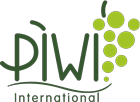PIWIS Cultivation suitability, grape variety characteristics and flavor profiles of selected white PIWI grape varieties.
Text: Barbara Richter (M.Sc.), Hochschule Geisenheim University, Andreas Stutz, Dr. Cornelia Wobar, Gisela Wustinger
Source: the german wine industry 10/2022
The cultivation of new PIWI grape varieties harbors opportunities and risks for winegrowers. This is independent of whether it is an organic or conventional farm. The PIWI grape varieties were not usually bred at the winemaker's premises. This means that the cultivation recommendations of the breeders are not 100 percent transferrable to the location of the respective winemaker. In addition, the type of expansion in the cellar plays a major role in the style of wine.
In practice, the term »terroir« takes on a whole new meaning with the PIWI vines. Resistance to mildew is not absolute. It depends on the location, the weather and the vintage, which in practice means that PIWI grape varieties also need plant protection around three to six times a year. In most cases, however, copper and sulfur are sufficient for crop protection.
By cultivating PIWI vines, up to 80 percent of pesticides can be saved compared to viticulture of traditional varieties, regardless of whether it is organic viticulture or conventional cultivation.

